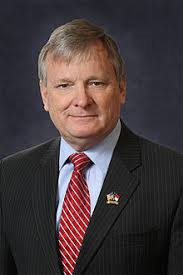Loyalty and Duty of Care to Our Members
By Treasurer Dale R. Folwell, CPA, LivingPower Newsletter Nov/Dec 2023

Department of State Treasurer (DST) focuses on loyalty and duty-of-care for public servants like you who teach, protect or otherwise serve the citizens of North Carolina. This is what drives DST and the North Carolina Retirement Systems (NCRS) to fulfill their mission to protect and preserve the state’s pension system and health care plans, while reducing fees and maximizing value.
Though we have had to navigate some uncharted waters over the last few years with stock market volatility and COVID, NCRS has been consistently in the check-delivery business. At our very core, we ensure benefits due to members are delivered as promised and on time, and that members and their families who are impacted by a life event are taken care of in a timely, efficient manner. I want to recognize our staff that works diligently with a member-first mentality to not only get business done but listen to what is needed to do good business.
Over the last year we launched a new phone system that allows easier access to information through an automated, self-service phone menu. Over 30% of members calling in now find what they need, on their own, through this system. Those that need to speak to a retirement counselor are holding on the line less than two minutes on average. Chat was recently implemented in ORBIT as an additional way to get the information you need. Users who participated in the soft launch of this service have given it a nearly perfect rating. We realize every member’s situation is different, so our counselors are dedicated to taking the time you need to provide value and service.
Recent legislation has brought positive changes impacting NCRS. Members with a retirement date on or after January 1, 2024, will see their first benefit payment made by direct deposit. Traditionally, a retiree’s first payment has been sent by paper check. New retirees will be able to lock in their retirement options earlier and NCRS will be able operate more efficiently as we continue to see record numbers of retirements each month.
For the second time in as many years, the state will pay a one-time supplement for benefit recipients who retired on or before October 1, 2023, are living as of October 1, 2023, and are members of the Teachers’ and State Employees’ Retirement System, Consolidated Judicial Retirement System, and the Legislative Retirement System. This one-time supplement will be issued on or before November 30 and is equal to 4% of the annual retirement allowance, where the annual retirement allowance is 12 times the monthly allowance payable for October 2023.
These funds did not come from the Plan itself and were appropriated by the General Assembly as a part of the budget passed on October 3, 2023. This does not apply to benefit recipients of the Local Governmental Employees’ Retirement System (LGERS), where a benefit increase may be granted by the LGERS Board of Trustees within certain statutory limitations.
Whether you are planning for or in retirement, there has been a seismic shift in this life phase. People are living longer, and this requires a revised budget strategy for income, expenses, and health care costs. The fact is you have a solid foundation in retirement with your monthly pension benefit and this should serve as your motivation. The NC Pension is widely regarded as one of the most secure and best-funded pensions in the United States. Additional savings in the NC 401(k) and NC 457 Plans, coupled with Social Security Income and outside assets, will also help in meeting a gap in retirement income. Each of you has navigated a change towards retirement and I encourage you to talk with someone younger than you to share your lessons learned.
The ancient Greek philosopher Heraclitus wrote that “no man ever steps in the same river twice, for it’s not the same river and he’s not the same man.” As we move to a new year, I wish each of you success in health and purpose and thank you for your service to the citizens of North Carolina.





